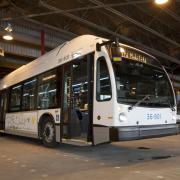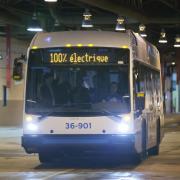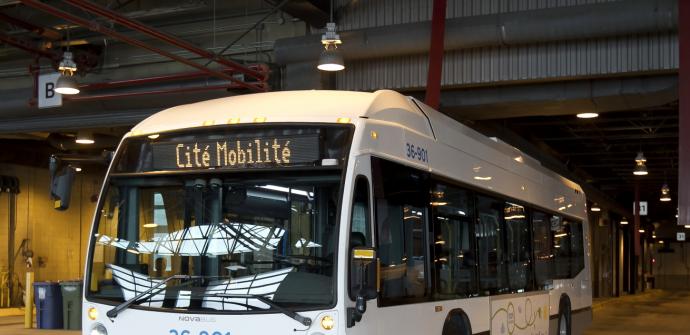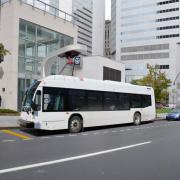During visits to the Montréal métro’s control room and the STM’s bus control centre, Denis Coderre, Mayor of Montréal, Laurent Lessard, Minister of Transport, Sustainable Mobility and Transport Electrification, and Philippe Schnobb, Chairman of the Société de transport de Montréal Board of Directors, announced that technical trials without passengers would begin in early 2017 for Nova Bus’ three fully electric buses on the 36 – Monk line.
Montréal, December 15, 2016 – During visits to the Montréal métro’s control room and the STM’s bus control centre, Denis Coderre, Mayor of Montréal, Laurent Lessard, Minister of Transport, Sustainable Mobility and Transport Electrification, and Philippe Schnobb, Chairman of the Société de transport de Montréal Board of Directors, announced that technical trials without passengers would begin in early 2017 for Nova Bus’ three fully electric buses on the 36 – Monk line.
« This is excellent news to kick off 2017, insofar as these trials are followed by operating the buses in passenger service in the spring, as planned. With City Mobility, the STM hopes to acquire the knowledge it needs to develop and operate an electric transit system with the future in mind. Indeed, our strategic plan calls for the purchase of 100% electric buses only for all surface transit by 2025, within the limits of available technology », declared Philippe Schnobb, Chairman of the STM Board of Directors.
This next phase follows in the wake of two quick-charging stations being installed at Angrignon bus terminus and at Square Victoria, and the delivery of a first bus at STM’s Lasalle bus garage.
« City Mobility is also integral to the vision of making Montréal a green and sustainable metropolis in which electric transportation plays a key role. This program is also taking place in several European cities, while Montréal is the very first in North America to participate, allowing the STM to position itself as the leader in North American in this field. In addition to that, we already have a métro that has been powered entirely by electricity since it opened in 1966 », explained Denis Coderre, Mayor of Montréal.
« This innovative, unifying project carries the expertise of both public and private stakeholders toward a common goal, that of making public transportation all-electric. Developed by Nova Bus, the vehicles are equipped with four batteries using Québec hydroelectric power by means of a quick-charging conduction system and will come with a TM4 powertrain system designed in Québec. As part of the Transportation Electrification Action Plan 2015-2020, this project will help us expand the electric vehicle industry in Québec, and I am very proud of that, » emphasized Laurent Lessard, Minister of Transport, Sustainable Mobility and Transport Electrification.
« We are also extremely proud of Nova Bus being at the forefront of the City Mobility demonstration program. Having three of our 100% electric LFSe Nova Bus vehicles chosen for this, a first in North America, is a testament to our leadership in terms of sustainable mobility. We are firmly committed to ensuring these tests are successful so that our joint expertise may be shared throughout North America », declared Raymond Leduc, President of Nova Bus and Prevost.
« Public transit electrification contributes to reducing greenhouse gas emissions. Hydro-Québec has been supporting electric transit projects for many years now and we are very pleased to lend our help and expertise to the City Mobility project », added Éric Martel, Hydro-Québec’s President and Chief Executive Officer.
Partners in transportation electrification
ity Mobility will assess the impacts of using quick-charging electric buses, under real operating conditions, with regards to a number of aspects, such as the transit experience for customers and drivers, planning and delivering bus service, maintenance, and more. Trials will continue until the end of 2019.
With a three-year timeframe, Montréal’s City Mobility project has a $16.7 M budget, including $11.9 M in financial support from Québec’s Ministry of Transport, Sustainable Mobility and Transport Electrification, $100 000 from Hydro-Québec and STM’s own $4.7 M contribution. Furthermore, to help this project move forward, Volvo and Nova Bus have invested $8 M in research and development into a transportation system using electric buses.
About the Transportation Electrification Action Plan 2015-2020
Today’s announcement is part of the Transportation Electrification Action Plan 2015-2020 and contributes to actions taken in the fight against climate change. By building on transport electrification, Québec, with its own source of clean energy, available in both large quantity and at competitive prices, is determined to become a leader in the use of electric means of transportation, while setting the standard for sustainable mobility in promoting the transition towards a low carbon economy.
To learn more about transportation electrification, go to: transportselectriques.gouv.qc.ca.
Technical file
Download the project’s technical file
Photos
Click on thumbnail to view in high res


- 30 -
Philippe Déry
Conseiller Affaires publiques
Société de transport de Montréal
514 280.7346
philippe.dery@stm.info
Mathieu Gaudreault
Attaché de presse, cabinet du ministre des Transports, de la Mobilité durable et de l’Électrification des transports
418 571-5038
Mathieu.gaudreault@transports.gouv.qc.ca
Marc-André Gosselin
Attaché de presse, cabinet du maire et du comité exécutif de la ville de Montréal
514 290-1194
Me Emmanuelle Toussaint
Vice President Legal and Public Affairs
Prevost et Nova Bus
Téléphone : 581 628-0516
Courriel : emmanuelle.toussaint@volvo.com
Louis-Olivier Batty
Conseiller stratégique
Relations avec les médias
Tél. : 514 289-4214
batty.louis-olivier@hydro.qc.ca


